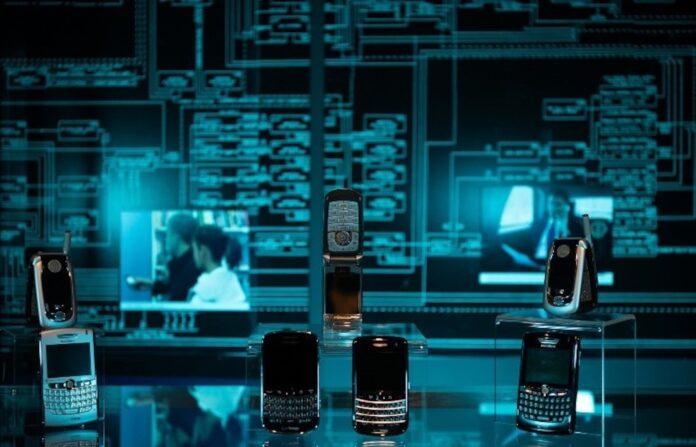When an NSA employee approached National Cryptologic Museum (NCM) Director Vince Houghton asking if he wanted “the Obama phones,” he didn’t hesitate to acquire the cryptologic gems for display at the museum.
“The Obama phones” are specially modified Motorola A840 models personally used by President Barrack Obama during his time in office. The new exhibit, which opened in August this year, includes three of these cell phones in addition to four blackberry devices also used by President Obama, several with the presidential seal.
“We had generic phones like these on display, but these are the ones that belonged to the former president,” said Deana Bowles, NCM’s curator. “When people saw Obama using a phone on television, the internet, social media, or wherever, these are the ones he was using.”
Following Obama’s term, NSA removed security modifications and classified data the phones contained from his presidency. Before the exhibit opening, NCM received approval from NSA and the White House Communications Agency to place the phones on display.
“This display shows people that changes in technology force us to do things differently and get used to new things, even the President of the United States,” Bowles said. “When Obama became President, he insisted on using his blackberry like when he was a senator, but the device would not accept the necessary security modifications. He had to learn these flip phones.”
For 30 years, people from across the Nation have come to witness the museum’s unique displays. According to Houghton, part of the NCM’s mission is to be one-of-a-kind. Since its founding in 1993, the NCM remains the Intelligence Community’s only completely public museum.
The NCM also displays artifacts that can’t be seen anywhere else, including original World War II German enigma machines for visitors to encrypt and decrypt messages, the last existing U.S. Navy Cryptanalytic Bombe, and Johannes Trithemius’ early 16th century “Polygraphiae” — the first-ever printed book on cryptology.
While artifacts like these help to make the NCM unique, Houghton envisions a museum that constantly changes, with new, genuine artifacts tied to moments in history so visitors can experience something new every time they enter the museum.
“I want to be able to say ‘This is the first code talker message ever transmitted during World War I,’” he said. “I want to point to the original Japanese naval message intercepted at Station Hypo in 1942 and proved we had broken the Japanese naval code JN-25.”
The NCM already owns artifacts with ties to people throughout history, including Hitler’s personal enigma machine, General Joseph Hooker’s Union Code Book from the Civil War, “Love letters” with unique encryptions exchanged between U.S. soldiers and their wives and sweethearts during World War II, and much more.
To bring his vision of the future of the museum to life, Houghton has a list of desired artifacts on the wall by his desk. It includes 25 cryptologic devices, machines, and correspondence that he wants to replace in the NCM’s inventory. He’s scratched one item off the list so far: the Obama phones.
Houghton hopes others from NSA contact him to offer items for museum display. Many may not consider sending items to the public museum because of classification restrictions, but Houghton explained that NCM has an offsite classified storage space to hold items during the declassification process.
The museum also has a massive storage space for new artifacts to be held safely. According to Houghton, the staff finds more and more each day.
“We still don’t know everything we have,” he said. “Eventually, they could become part of temporary exhibits for visitors to experience.”
“By late fall this year, we’ll have three to four areas designated for temporary exhibits,” Houghton added. “We’ll be ready for years to come.”
For more information about the NCM, including hours of operation, visit nsa.gov/museum.




